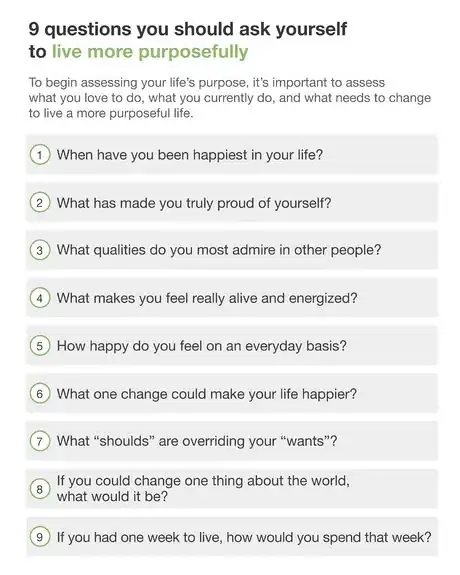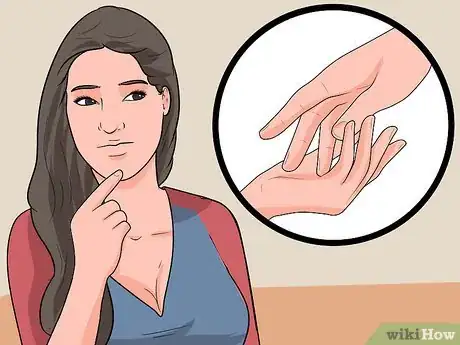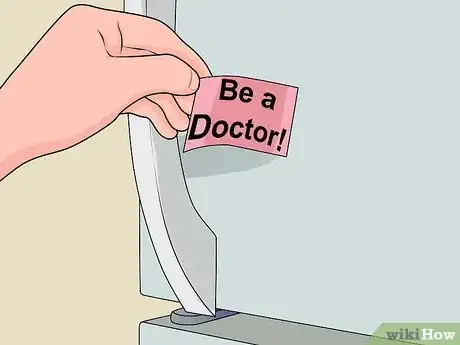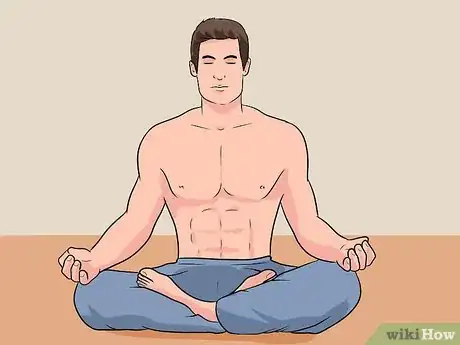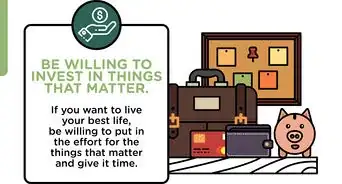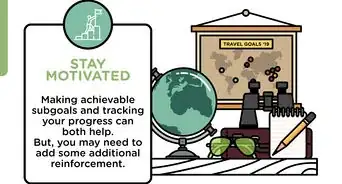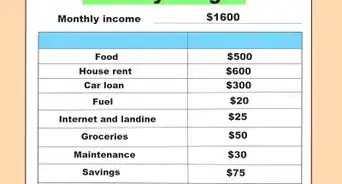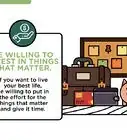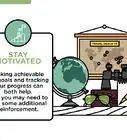This article was co-authored by Adam Dorsay, PsyD. Dr. Adam Dorsay is a licensed psychologist in private practice in San Jose, CA, and the co-creator of Project Reciprocity, an international program at Facebook's Headquarters, and a consultant with Digital Ocean’s Safety Team. He specializes in assisting high-achieving adults with relationship issues, stress reduction, anxiety, and attaining more happiness in their lives. In 2016 he gave a well-watched TEDx talk about men and emotions. Dr. Dorsay has a M.A. in Counseling from Santa Clara University and received his doctorate in Clinical Psychology in 2008.
There are 10 references cited in this article, which can be found at the bottom of the page.
wikiHow marks an article as reader-approved once it receives enough positive feedback. This article received 18 testimonials and 89% of readers who voted found it helpful, earning it our reader-approved status.
This article has been viewed 519,898 times.
If you don't feel fulfilled by or happy with your life, you may decide to evaluate your life’s purpose. While this can be a challenging self-examination that may lead you to believe that you’ve been living life the “wrong way,” take heart; it’s never too late to begin living the life that you want to live—a life that is meaningful and happy. Find your life’s purpose, then take action to implement the kind of life you really want to live.
Steps
Evaluating Your Interests
-
1Keep a purpose journal. Journaling is a useful tool for making any changes to your life or your perspective. Create a dedicated journal that will help you write down and explore your thoughts about your life’s purpose, your passions, and your joys.[1]
- Do not worry about how your writing sounds; this journal is just for you, and no one else will read it. It’s important that you are completely open and honest, not that the writing is particularly good.
-
2Question yourself. To begin assessing your life’s purpose, it’s important to assess what you love to do, what you currently do, and what needs to change to live a more purposeful life. Some questions to consider are:[2]
- When have you been happiest in your life?
- What has made you truly proud of yourself?
- What qualities do you most admire in other people?
- What makes you feel really alive and energized?
- How happy do you feel on an everyday basis?
- If you had one week to live, how would you spend that week?
- What “shoulds” are overriding your “want tos”?
- If you could change one thing about the world, what would it be?
- What one change could make your life happier?
Advertisement -
3Create a list of your interests and passions. Write down the things that you enjoy spending time doing. These can be related to your work, your personal life, or your home life. They should be things that make you happy, that you really enjoy doing. These are things that you enjoy doing without getting paid to do them, and they are likely things that cause you to lose track of time.[3]
-
4Write down what you love. The things and people that you love are very important to the quality of your life and how you spend your time.[4] Acknowledging the things and people that you love can help you focus your passions and your purpose. Focusing on things that you love with your heart, rather than value with reason, can bring you closer to your true passions.
- If your primary loves are your family, you are unlikely to feel fulfilled if your life is dominated by a career that causes you to spend almost all of your time away from them.
-
5Find your joy. This is similar to your interests and passions, but finding your joy is a little more focused.[5] To find your joy, think about what makes you feel blissfully happy. Think about the last time you laughed so hard your sides hurt, or smiled so much that your cheeks were sore.[6]
- It can be useful to think about the type of play you most enjoyed as a child.[7] Does similar play (or work that mimics that sort of play) bring you a childlike joy?
-
6Use backwards planning. Imagine yourself at 90 years old. Imagine that you are looking back on your life, and you are completely content that you lived a meaningful, wonderful life.[8] Imagine what the specifics of that life are, then work backwards through time to determine what you need to do by each decade between now and 90 in order to live that complete life.
- For example, say that you picture yourself 90 years old, surrounded by great-grandchildren, happily retired after a successful career helping your community, living in your own home with a lot of land.
- This tells you that you want to have a family, that you’d like to have a career helping others, and that you would like to live independently in a rural setting.
- Your backwards planning could lead you to determine that you should start having children when you are 28, you’d like to find a position as a social worker by 25, and you should maintain your health constantly so that you can continue to live independently in old age.
-
7Don't listen to social norms. It's common to think about what others expect from you. Parents, friends and society have certain expectations from us all with good intentions. Social norms might tell you to not start that business, not quit your job or take a pay cut for a less prestigious job. But ultimately you are the only one that can decide what's right for you.
- Think from first principles - what change do you personally want to see in the world if you didn't care what others thought of you?
- Be conscious of what thoughts are your own vs. those passed onto you. Have you ever thought starting a business is hard? Or that you can't make money following your passion? These are beliefs generally passed down to us that may not be true. Think to yourself what thoughts are yours vs. what others have told you.
Stepping Outside Yourself
-
1Determine the purpose of humanity. This is a weighty question, and it may take some time and reflection to decide, but if you can determine what you think the purpose of humanity is, you can scale that idea down and apply it to your own life.[9]
- For example, you may decide that the purpose of humanity is to help each other thrive in the world. Your own personal purpose can then be to help people in your community thrive, and you can determine what steps you need to take to work towards that.
-
2Find people who inspire you. Think about people whom you find truly inspiring. These can be world leaders, historical figures, or people from your own life. Think about why these people are inspirational, and determine specific actions or characteristics they have that you’d like to emulate. .
- You may want to keep this list in your purpose journal. Remember that you do not have to admire or emulate every aspect of an individual—rather, you are using the individual to home in on specific characteristics that you would like to have too.
-
3Leave your bubble. Leaving your personal bubble, or your comfort zone, means having a broader view of the world and the people in it.[10] We tend to be somewhat self-centered in our day-to-day lives, but leaving your bubble gives you the opportunity to view the wider world around you. With this renewed realization of the rest of the world, you can more objectively see your place in the world and evaluate your passions and purpose.
- Once you have a greater awareness of other people around you, decide how you want to interact with those people. Determine how you would like other people to view you in relation to themselves, and then work to be that person for them.
-
4Ask friends what your strengths are. If you are having difficulty assessing yourself, or if you’d like a second opinion, ask some close friends what they think your strengths are.[11] They may offer some insight that you have trouble seeing yourself.
- For example, you may not realize that your own actions inspire your friends to want to emulate you. A friend might say, “I think you are great at putting a plan into action once it’s made, rather than waiting for someone else to get started.” You can tie this strength into your purpose.
-
5Stop thinking in absolutes. Many people think that their purpose (or their career, or their interests) have to revolve around one thing. But sometimes our passions are about balancing multiple interests that fulfill different aspects of our needs and wants. Realizing that your one purpose (if you choose to limit it to one) can be made up of multiple facets can offer you more flexibility in setting that purpose.
- For example, if your life’s purpose is “to bring happiness to myself and others,” you may have the sub-purposes “to feel fulfilled in my work, to be patient with my family, to make my kids laugh, and to listen well to my friends.” All of these work towards your greater purpose.
- The advantage to having multiple facets to your life’s purpose is that if one area is lagging or not going well, you won’t feel like you’re entirely off track. For example, if your work life is not fulfilling, but your home and social lives are, you can still feel like you’re working towards happiness.
-
6Set your purpose. After you have evaluated yourself and expanded your view outside of yourself, decide what you’d like your life’s purpose to be. Remember that it’s okay if it changes in the future. It’s important to have a goal and direction now, even if you alter it later as you change and grow.
- Once you have decided your purpose, write it down. Post it somewhere that you can read it every day, reminding yourself of what you want in life. You can ask yourself each day if you’ve done things to work towards that purpose.
Acting on Your Purpose
-
1Write your personal mission statement. Another way to think of your life’s purpose is to frame it as a personal mission statement. You may want to convert your set purpose into a personal mission statement, which tends to take a more active, actionable format.
-
2Meditate to set your intentions. Meditation or mindful yoga can be useful for setting your intention for your day, your week, your year, and your life. Clearing your mind and allowing yourself to picture your life the way you’d like for it to be can help you make steps towards living that life of your dreams.[12]
-
3Stop trying to please other people. Even if your purpose has a social element to it, trying to please people around you on a daily basis is likely to hinder, not help, your overall purpose. Be sure that the actions you’re taking in your life are your choice, not the choices of other people around you.
- Often, people do not know what is likely to make them truly happy, so even if your goal is to bring happiness to yourself and others, meeting the immediate demands of others won’t help you live your purpose.
-
4List the actions that lead towards your purpose. In your purpose journal, write a list of actions that you can take that will lead you directly towards your life’s purpose. You may not be able to take each action immediately, but realizing the steps that you should take to reach your purposeful life can help you move in the right direction.
- For example, if your current career is not fulfilling and doesn’t mesh with your life’s purpose, you may write “find a new career” on the list. However, you may not want to immediately quit your current job before finding a new one due to the practicalities of paying bills and keeping your family housed and fed.
- Divide your list into short-term, medium-term, and long-term changes.
-
5Do the things that lead you to fulfill your purpose. Once you have determined the actions you will need to take to fulfill your life’s purpose, take those steps. Begin with the short-term changes and work towards long-term changes. Sometimes taking action instead of thinking too hard can bring you greater clarity and happiness.[13]
-
6Revisit your journal. Be sure to go back and read your purpose journal and related lists periodically to make changes, add to it, or remind yourself of your purpose. After some time has passed, you may find yourself drifting back into the comfortable familiarity of your daily life. While there is nothing wrong with this, you will likely feel more fulfilled generally if you are working toward your now-established life’s purpose.
-
7Avoid activities that counter or distract from your purpose. It would certainly be difficult to avoid doing any activity that doesn’t directly work towards your life’s purpose. If you want to bring happiness to yourself and others, but you don’t like doing laundry, you will likely still need to do laundry occasionally. However, you can avoid doing activities that work against your life’s purpose.
- For example, if your purpose is to bring happiness to yourself and others, you should avoid saying things that are hurtful to others. You should avoid things that make you truly unhappy, like spending time with individuals that cause you to feel bad about yourself.
References
- ↑ https://www.urmc.rochester.edu/encyclopedia/content.aspx?ContentID=4552&ContentTypeID=1
- ↑ https://positivepsychology.com/introspection-self-reflection/
- ↑ Adam Dorsay, PsyD. Licensed Psychologist & TEDx Speaker. Expert Interview. 11 April 2019.
- ↑ https://positivepsychology.com/ikigai/
- ↑ https://greatergood.berkeley.edu/article/item/how_to_find_your_purpose_in_life
- ↑ Adam Dorsay, PsyD. Licensed Psychologist & TEDx Speaker. Expert Interview. 11 April 2019.
- ↑ http://www.forbes.com/sites/barbarastanny/2011/12/13/5-techniques-for-pinpointing-your-life-purpose/2/
- ↑ https://www.opencolleges.edu.au/informed/features/reverse-planning-can-help-students-reach-goals/
- ↑ https://positivepsychology.com/find-your-purpose-of-life/
- ↑ https://positivepsychology.com/comfort-zone/
- ↑ Adam Dorsay, PsyD. Licensed Psychologist & TEDx Speaker. Expert Interview. 11 April 2019.
- ↑ https://www.academia.edu/26063808/LIFE_PURPOSE_AND_GUIDED_MEDITATION_POWERPOINT
- ↑ Adam Dorsay, PsyD. Licensed Psychologist & TEDx Speaker. Expert Interview. 11 April 2019.
About This Article
If you feel like you’re struggling to find your purpose in life, write down the things in your professional or personal life that you enjoy doing so you have a clear idea of your passions. You should also try asking yourself questions to find out what makes you happy, like “When was I happiest in my life?” or “Which qualities do I admire most in others?”. To get help answering these questions, try asking close friends what they think your strengths and talents are, which will help you determine what you’re good at. Additionally, try to do activities that put you outside your comfort zone or pose you with new challenges, since it will be easier to see your place in the world when you look at it from a new angle. Once you’ve identified a goal that would help you reach your purpose in life, like changing your career, write down a series of smaller steps to help you get there. For tips from our co-author on how to use backward planning to find out what you want from life, keep reading!

